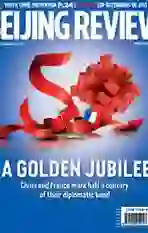THIS WEEK PEOPLE
2014-02-17
“Such seemingly outdated and primitive techniques truly represent traditional Chinese culture, and people should take pride in them.”
Jiao Ruiqing, co-author of the book Four Chinese, which documents the daily lives of four farmers each using a traditional technique in their work, at the books launch ceremony in Beijing on January 10
“Fancy clubs in parks and historical buildings are clearly invasions into public resources. These sites are public treasures, which should be open to the general public, rather than the privileged few.”
Kong Fanzhi, former Director of Beijing Municipal Bureau of Cultural Heritage, commenting on Beijing Municipal Governments order for high-end clubs in public parks to close or operate as ordinary restaurants
“The core strategy of our international development is to foster enthusiasm and trust in traditional Chinese medicine among foreign patients by showcasing its effectiveness and relatively few side effects. We have sensed a widespread acceptance of and growing demand for it.”
Ding Yongling, Deputy General Manager of Tongrentang, a Beijing-based pharmaceutical company dating back 300 years, on his companys plan to run 100 outlets abroad by 2015
“We will improve policies to encourage and support qualified enterprises of all kinds to participate in bidding for railway construction projects.”
Zhao Guoqing, chief engineer and spokeswoman of the National Railway Administration, pledging to create a sound policy environment for private investment in the railway sector, at a press conference on January 14
TOP SCIENTISTS HONORED
Physical chemist Zhang Cunhao (left) and nuclear weapons expert Cheng Kaijia won Chinas top science award for their outstanding contributions to scientific and technological innovation on January 10. The pair, both academicians with the Chinese Academy of Sciences (CAS), was presented with certificates by President Xi Jinping at an annual ceremony. Winners are also entitled to an award of 5 million yuan ($820,000) each. Zhang, 85, went to the United States to further his studies in the 1940s and obtained a masters degree in 1950. He then returned to China despite hard living conditions, and devoted himself to scientific research at the Dalian Institute of Chemical Physics of the CAS in the northeastern port city. Zhang has focused on many pioneering technologies, including rocket propellants and lasers.
Cheng, 96, has participated in more than 30 of Chinas nuclear experiments. He also played a key role in developing the countrys first atomic and hydrogen bombs, as well as the combination of the two bombs. Cheng devoted years to living in the vast Gobi Desert in northwest Chinas Xinjiang Uygur Autonomous Region beginning in 1963. Cheng also participated in writing Chinas first academic document for atomic bomb research and experiments, designing a plan for setting off an atomic bomb at an iron tower higher than 100 meters, and planning the missions and the establishment of an institute dedicated to nuclear weapons experiments. His team established Chinas understanding of nuclear explosions, the research into them, different kinds of nuclear experiments, and technical safety standards.endprint
